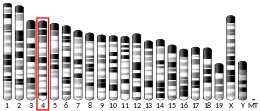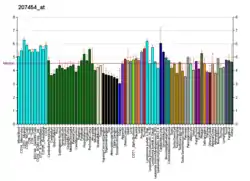Glutamate receptor, ionotropic kainate 3 is a protein that in humans is encoded by the GRIK3 gene.[5][6]
This gene encodes a protein that belongs to the ligand-gated ionic channel family. It can coassemble with either GRIK4 or GRIK5 to form heteromeric receptors and acts as an excitatory neurotransmitter at many synapses in the central nervous system. RNA editing in the mRNA has been reported.[6]
See also
References
- 1 2 3 GRCh38: Ensembl release 89: ENSG00000163873 - Ensembl, May 2017
- 1 2 3 GRCm38: Ensembl release 89: ENSMUSG00000001985 - Ensembl, May 2017
- ↑ "Human PubMed Reference:". National Center for Biotechnology Information, U.S. National Library of Medicine.
- ↑ "Mouse PubMed Reference:". National Center for Biotechnology Information, U.S. National Library of Medicine.
- ↑ Puranam RS, Eubanks JH, Heinemann SF, McNamara JO (Apr 1994). "Chromosomal localization of gene for human glutamate receptor subunit-7". Somat Cell Mol Genet. 19 (6): 581–8. doi:10.1007/BF01233385. PMID 8128318. S2CID 44460126.
- 1 2 "Entrez Gene: GRIK3 glutamate receptor, ionotropic, kainate 3".
Further reading
- Nutt SL, Hoo KH, Rampersad V, et al. (1995). "Molecular characterization of the human EAA5 (GluR7) receptor: a high-affinity kainate receptor with novel potential RNA editing sites". Recept. Channels. 2 (4): 315–26. PMID 7719709.
- Roche KW, Raymond LA, Blackstone C, Huganir RL (1994). "Transmembrane topology of the glutamate receptor subunit GluR6". J. Biol. Chem. 269 (16): 11679–82. doi:10.1016/S0021-9258(17)32623-6. PMID 8163463.
- Ripellino JA, Neve RL, Howe JR (1998). "Expression and heteromeric interactions of non-N-methyl-D-aspartate glutamate receptor subunits in the developing and adult cerebellum". Neuroscience. 82 (2): 485–97. doi:10.1016/S0306-4522(97)00296-0. PMID 9466455. S2CID 23219004.
- Dias Neto E, Correa RG, Verjovski-Almeida S, et al. (2000). "Shotgun sequencing of the human transcriptome with ORF expressed sequence tags". Proc. Natl. Acad. Sci. U.S.A. 97 (7): 3491–6. Bibcode:2000PNAS...97.3491D. doi:10.1073/pnas.97.7.3491. PMC 16267. PMID 10737800.
- Schiffer HH, Swanson GT, Masliah E, Heinemann SF (2001). "Unequal expression of allelic kainate receptor GluR7 mRNAs in human brains". J. Neurosci. 20 (24): 9025–33. doi:10.1523/JNEUROSCI.20-24-09025.2000. PMC 6773004. PMID 11124978.
- Enz R (2002). "The actin-binding protein Filamin-A interacts with the metabotropic glutamate receptor type 7". FEBS Lett. 514 (2–3): 184–8. doi:10.1016/S0014-5793(02)02361-X. PMID 11943148. S2CID 44474808.
- Begni S, Popoli M, Moraschi S, et al. (2002). "Association between the ionotropic glutamate receptor kainate 3 (GRIK3) ser310ala polymorphism and schizophrenia". Mol. Psychiatry. 7 (4): 416–8. doi:10.1038/sj.mp.4000987. PMID 11986986.
- Delorme R, Krebs MO, Chabane N, et al. (2004). "Frequency and transmission of glutamate receptors GRIK2 and GRIK3 polymorphisms in patients with obsessive compulsive disorder". NeuroReport. 15 (4): 699–702. doi:10.1097/00001756-200403220-00025. PMID 15094479. S2CID 29816578.
- Preuss UW, Zill P, Koller G, et al. (2006). "Ionotropic glutamate receptor gene GRIK3 SER310ALA functional polymorphism is related to delirium tremens in alcoholics". Pharmacogenomics J. 6 (1): 34–41. doi:10.1038/sj.tpj.6500343. PMID 16314883. S2CID 5874096.
- Samochowiec J, Grzywacz A, Kucharska-Mazur J, et al. (2006). "Family-based and case-control association studies of glutamate receptor GRIK3 Ser310Ala polymorphism in Polish patients and families with alcohol dependence". Neurosci. Lett. 396 (2): 159–62. doi:10.1016/j.neulet.2005.11.030. PMID 16356644. S2CID 23136504.
- Schiffer HH, Heinemann SF (2007). "Association of the human kainate receptor GluR7 gene (GRIK3) with recurrent major depressive disorder". Am. J. Med. Genet. B Neuropsychiatr. Genet. 144 (1): 20–6. doi:10.1002/ajmg.b.30374. PMID 16958029.
- Kim JM, Lee KH, Jeon YJ, et al. (2007). "Identification of genes related to Parkinson's disease using expressed sequence tags". DNA Res. 13 (6): 275–86. doi:10.1093/dnares/dsl016. PMID 17213182.
External links
- GRIK3+protein,+human at the U.S. National Library of Medicine Medical Subject Headings (MeSH)
This article incorporates text from the United States National Library of Medicine, which is in the public domain.
This article is issued from Wikipedia. The text is licensed under Creative Commons - Attribution - Sharealike. Additional terms may apply for the media files.




